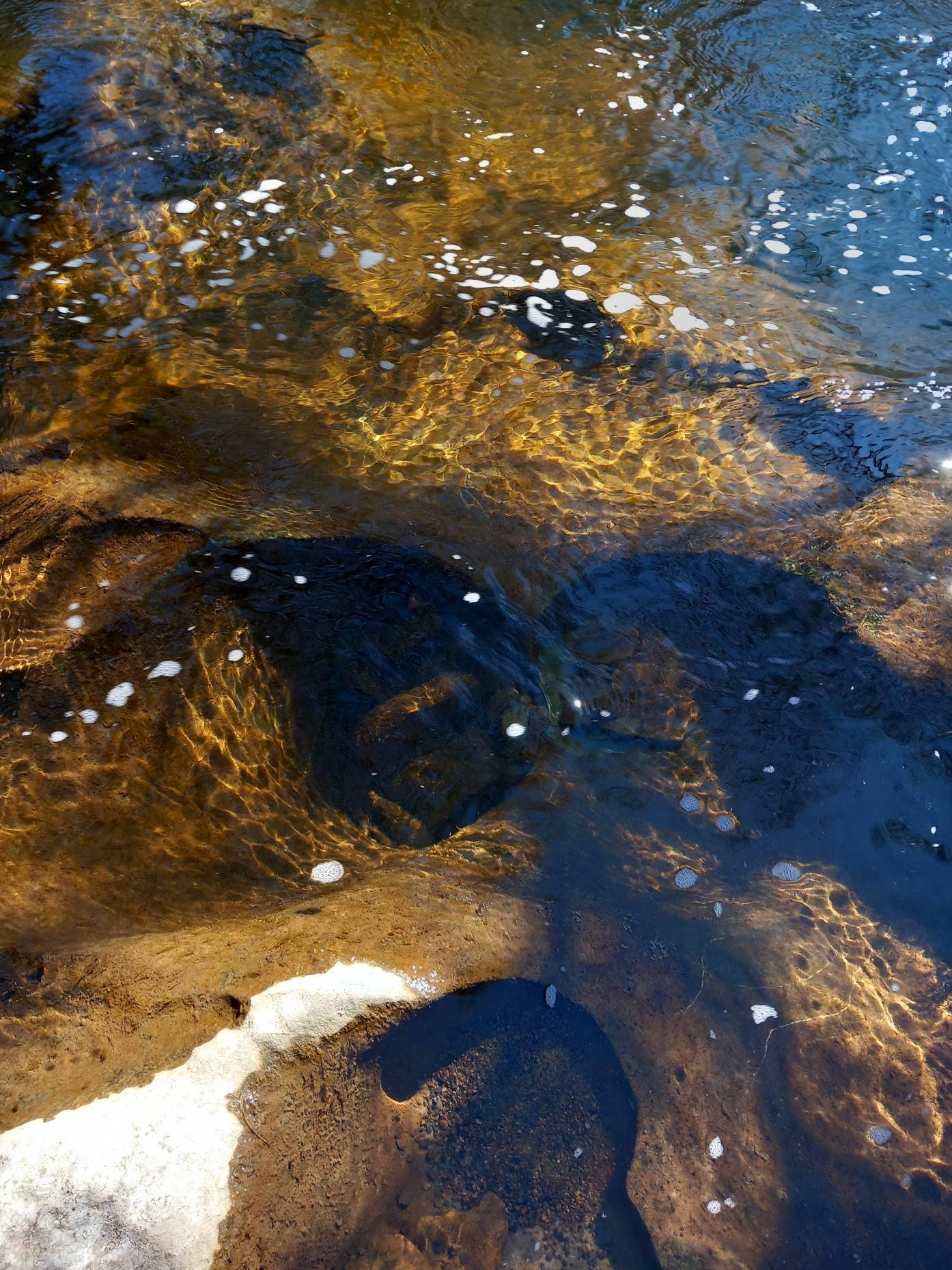A Substack friend of mine, , the best kind of friend, one who makes me smile on a bleak day, wrote these words in her recent post ‘The vale of eternity’.
‘The deep truth is, we were never banished from Eden. Heaven and earth have never been two different places; they are one and the same. There is nowhere more sacred to get to. We are already here, in this place our spirit recognizes; and here are we mended of our ills, for a while.’
I read her words a few mornings ago when I came back up to the house from the river. I had the itchy feeling of knowing there was something I wanted to say. She brought it into focus for me. I am grateful.
This morning is made of alabaster, too soft a stone for the monumental art of cathedrals. Her skin is almost white enough for sanctity, but for a blush of sinful pink when she becomes aware of her own beauty, blossoming under the intricate fingertips of first light. Long shadows shorten, raising the night-flattened dough of the slope below Highfall Scarr into a momentary likeness of a crone’s face, the tracks of her forgotten tears cutting down across the wrinkled terracing of the soil’s slow slump towards wisdom.
At the peeping of the sun over Mallerstang edge we all stand up as one. The hare in the castle field at periscope depth in the long grass, his ears awash. The hazel thicket that hangs out over Striding Pool, teaching fish the secrets of the universe. The polecat in his scurry-back hole. The barn owl in her cloak of invisibility, the cavity where she is perched insisting that there is nothing up its sleeve. Even the sand martins, incapable of stillness, contrive a steep stall turn to pirouette briefly in place. It’s the best they can do. The whole congregation rises quietly to their feet as the dunnock sends out the first high notes from the uncountable unseen organ pipes of creation to announce the day. Prayers in hand, we look intently for salvation. Not skywards. No, not in this church. Our eyes fall to the peat-stained glass of the river, fresh from rain. The whisk of the river’s eddy whips all our reflections into one.
We are gathered here, in the sight of Hangstone Fell, because the single bell for convocation had tolled, up and down the valley, while we dreamed in our beds, or stood dormant in the darkness of Jinny Wood, or foraged by smell in the top hayfield or hunted by ear from the arrow-slit windows of Pendragon Castle – each according to their nature. We were enjoined to bear witness. Here. This morning.
Now, in the doorway of dawn, we hang in the balance. We are waiting. There is a shuffling in the pews. Family hassocks, renewed every second generation, whisper to the flagstones that god is late, again. The dunnock, as any parish organist would, improvises a few extra bars to extend the introit until the service begins, hoping to avert a scandal. But reaching the boundary of harmonic absurdity, the little brown bird falls silent. Time, the church warden, steps into the breach, stretching out his arms wider and wider, until he must surely do himself a mischief. A tawny owl clears his throat as if to begin. All eyes turn. He shrugs and ruffles his dignity back into place. Just a bone, for heaven’s sake. A little bone stuck in his gullet.
The truth is, there is no minister here to lead us into the psalm. And the badger hasn’t got all day. The kestrel has mouths to feed. We are on the point of disassembling, one from the other. Thoughts are beginning to turn towards the grit and grind of the coming day.
Some say they heard it first. Others swear there was silence. A toad still dines out on the story of the blue lightning that flashed upstream, just inches above the river. A cyan spark previously unknown to science. He says that there was a faint smell of ozone. Perhaps there was. For most of us there was a shock as if of static electricity, and an intimation of grace. Only the jackdaws, high in their cawing kingdoms above the river, reported a tiny bird, barely bigger than a robin,1 carrying the original light of the world.
I know that a few people will read this in North America and think instantly of their beautiful robins, Turdus migratorius. Writing in northern Europe, the robins here are Erithacus Rubecula, which are much smaller birds, about the size of a sparrow. In my experience, when people first see a kingfisher they almost always exclaim ‘Oh! I thought they were so much bigger.’






The beauty, the restful and igniting poetry, within your words gives me a little leap, like a rustling-awake sort of feeling... you open my window into nature's secrets & delights wide... so much imagry to gather and hold close, to savor---thanks for the morning bouquet...
Here in the eastern US, we have a black and grey kingfisher who ratchets about the pond calling out the days news. He's a joyful irritant, it that makes any sense. I delight in the sight of him. But then, I am not a minnow. I love your prose!!